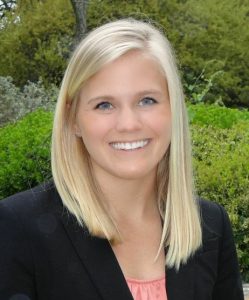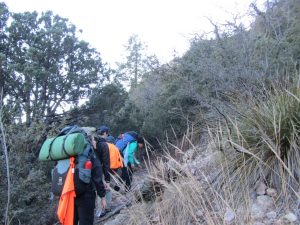 Elaine Posluszny graduated from BHP in 2014 and went to work for Deloitte Consulting, doing healthcare strategy work. She has recently moved back to Austin to work for the new Dell Medical School as Assistant Director for Care Transformation, where she is involved in operational and strategic planning for new clinics opening in 2017.
Elaine Posluszny graduated from BHP in 2014 and went to work for Deloitte Consulting, doing healthcare strategy work. She has recently moved back to Austin to work for the new Dell Medical School as Assistant Director for Care Transformation, where she is involved in operational and strategic planning for new clinics opening in 2017.
Take me through your career so far.
My junior internship I worked in investment banking in Houston. While it was challenging and exciting, I decided not to pursue that field after graduation. I looked instead at management consulting because it was still rigorous and exciting, but the content was broader. After graduating, I started with Deloitte in their Strategy Group. At Deloitte, I immediately expressed my interest in healthcare. During my time there, I worked in healthcare and medical device M&A deals. I travelled almost every week of those two years – across the continent from Vancouver stretching to Connecticut and international.
Now I have transitioned to working at the Dell Medical School in Austin. Among many things, Dell Medical School educates future physicians and provides innovative care for patients in Austin and Travis County. My work is focused on the second of those two missions, providing an innovative health care option for patients in Austin. I work in the Chief Business Office along side clinicians to help develop new clinical programs that meet the community’s need and are financially sustainable. Our collective works focuses on providing care that improves patient’s outcomes and lowers cost. Instead of opening clinics with the traditional model, which is often doctor-centric, expensive and outdated, we are taking a patient-centric view and to redefine how care can be delivered in an integrated, more valuable way.
What is interesting to you about working in healthcare strategy and operations?
The worst day of my life is probably going to be sitting in the waiting room of a hospital. On top of being terrified, I’ll probably be frustrated at the lack of efficiency, integration and transparency of the entire healthcare system. I don’t want to wait until that day to start thinking about all the problems in health care. We all know that health care is flawed. A lot of people sigh and accept the flaws of health care as ‘part of the system’ or ‘just the way it is’. But I disagree. I think there is opportunity to change. It is complicated and slow, but to me, it’s the most important thing I could spend my time on. Because at the end of the day, our health, and our family’s health is all that matters.
What were your main takeaways from working at Deloitte?
Comfort in ambiguity is a valuable skill that is hard to learn. When you are a consultant, you show up at a client site and no one knows who you are. You have to prove your worth and understand the problem in a short amount of time. Every day is uncomfortable and hard to navigate. I realized that honing in on a problem and a creative solution in an ambiguous situation is a valuable skill, and requires a unique environment like consulting, sales or a startup.
You are only two years out from graduation, yet you have already done so much. Tell me more about your work experiences during your time at UT?
The most unique and impactful work experience in college was working for Trendkite, a startup in Austin. I cold called the founder after reading a posting for an unpaid internship at Capital Factory. I worked with the original 3 founders as they navigated what type of company they wanted to be, and earned their first business. Now, four years later they have more than 100 employees and a big office downtown. It is incredible to see how that business idea grew. I feel lucky I got to work with them at such a young stage and watch it grow. I have been able to take the lessons I learned in the startup environment to my current role with the medical school – which is also similar to a startup since it is so new.
The Dell Med School is known for innovation. How are you seeing that innovative spirit in the work you are doing there?
One example is the financial modeling we are doing. There is an appetite in the insurance market for value based care. Instead of only modeling for fee for service, we also model for the future if we used bundled pricing. We ask ourselves, if we could meet that demand, even if it’s years away, what could it look like?
What challenges are you working on right now related to care transformation?
Bills and insurance are very confusing to people. Coordinating all the appointments is confusing. We want that to change. And most importantly, we want patients to get better, or in health lingo, improve outcomes. Today, even with all the bills, all the insurance, all the appointments, the health care system does not do a good job of tracking if people are getting better. Is their pain really going away? Are they able to walk better than they could before? Did they stay healthy? If we’re trying to make patients better, we should start asking patients, “how are you?”. And that’s exactly what Dell Medical intends to do.
You participated in Texas 4000. What was that experience like for you?
I learned so many life lessons while sitting on a bike saddle. I learned that you can not bike 4,500 miles to Alaska in one step. You take it one rest stop, one mile, on pedal stroke at a time. I try to apply that lesson every day. We aren’t going to make healthcare better in one day or with one piece of legislation, but we also aren’t going to make healthcare better if we don’t get on the bike and start pedaling. No challenge is impossible.
What advice do you have for current students?
Don’t think you can plan everything. Be okay with not knowing exactly where your life is going to be, even in the next one years to three years. Rest easy in the fact that life will take you where it takes you, no matter whether you choose that job or the other. There isn’t a right or wrong choice. Surprises have been the best parts of my life so far.

 The group loved the experience, and luckily there were no injuries or major setbacks during the week. “My favorite parts of the trip were being able to truly experience an unknown environment, getting to know everyone in BHP fully, and testing my boundaries,” said Maggie White, a BHP freshman. “I am so grateful that BHP gave me this opportunity to push myself to be a better person.”
The group loved the experience, and luckily there were no injuries or major setbacks during the week. “My favorite parts of the trip were being able to truly experience an unknown environment, getting to know everyone in BHP fully, and testing my boundaries,” said Maggie White, a BHP freshman. “I am so grateful that BHP gave me this opportunity to push myself to be a better person.” The whole group agreed that one of the best outcomes of the trip was that they all bonded. The students didn’t know each other well before the trip, and are now very close. Those on the trip also agreed that they learned a great deal about leadership and their own leadership style. Madison Gwynn noted the importance of helping those you are leading become independent. Nathan Hsu learned the skill of explaining the big picture, while outlining the important details.
The whole group agreed that one of the best outcomes of the trip was that they all bonded. The students didn’t know each other well before the trip, and are now very close. Those on the trip also agreed that they learned a great deal about leadership and their own leadership style. Madison Gwynn noted the importance of helping those you are leading become independent. Nathan Hsu learned the skill of explaining the big picture, while outlining the important details.
 Elaine Posluszny graduated from BHP in 2014 and went to work for Deloitte Consulting, doing healthcare strategy work. She has recently moved back to Austin to work for the new Dell Medical School as Assistant Director for Care Transformation, where she is involved in operational and strategic planning for new clinics opening in 2017.
Elaine Posluszny graduated from BHP in 2014 and went to work for Deloitte Consulting, doing healthcare strategy work. She has recently moved back to Austin to work for the new Dell Medical School as Assistant Director for Care Transformation, where she is involved in operational and strategic planning for new clinics opening in 2017.